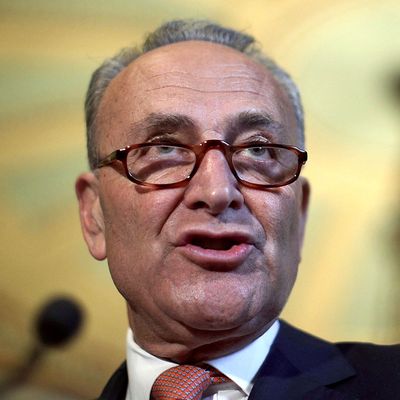
The Democratic Party is in excellent shape going into the 2018 elections, except for the fact that most voters believe the party is “out of touch” and stands for nothing, while the progressive base — which has a hard-earned reputation for neglecting to vote in midterms — currently evinces less enthusiasm about turning out next year than do their conservative counterparts.
On Monday, Team Blue unveiled its plan for addressing these liabilities: an economic message aimed squarely at the middle class’s material concerns.
Following the tragic events of November 8, there was broad consensus within the Democratic tent that Hillary Clinton’s campaign could have used a stronger economic message. But agreement on what, precisely, that message should have been was difficult to come by. Bernie Sanders and his acolytes insisted that the social-democratic programs at the heart of his campaign — single-payer health care and free public college — were the party’s tickets back to power. Others favored proposals that were less expensive, and more directly connected to job creation.
The party’s new consensus agenda elides its internal debates over massive expansions to the welfare state (and thus, the divisive question of middle-class tax increases). But on regulatory matters, the Democrats’ “Better Deal” is unabashed in its populism. In a New York Times op-ed introducing the new platform, Senate Majority Leader Chuck Schumer writes that the “wealthiest special interests” have rigged America’s economic and political systems against working people; that in the past, Democrats have “too often hesitated from taking on” powerful corporations; and that the party will rectify this mistake by making aggressive antitrust enforcement one of its signature issues.
The “Better Deal” agenda (the name is intended as both a reference to the New Deal and jab at the deal-artist-in-chief) describes the past 30 years of corporate consolidation as a threat to America’s consumers, workers, and democracy. That last bit is significant: For decades now, antitrust enforcement has focused narrowly on the “consumer welfare” standard — evaluating mergers on the sole basis of their likely impact on consumer prices.
Progressive policy wonks contend that regulators routinely approve mergers that violate this standard. But they also argue that this single criterion is insufficient. When America’s antitrust laws were first passed, they were intended not merely to protect consumers against price-gouging, but also to prevent our democracy from being dominated by a handful of corporate behemoths. The fact that regulators now ignore the political implications of corporate consolidation — even as Wall Street’s largest firms have proven to be “too big to fail,” and their top executives “too big to jail” — is itself a testament to the nefarious influence of monopolies, such policy thinkers maintain.
What’s more, the economic effects of consolidation are not limited to prices. Goldman Sachs recently cited monopolization as one reason why workers have seen their share of economic growth steadily decline, while economists at New York University have suggested that corporate consolidation may explain why U.S. companies don’t invest nearly as much as they once did (big firms have become so insulated from competition, they feel little need to invest in maintaining a competitive edge).
The Better Deal’s policy proposals reflect these broader concerns about consolidation. The Democrats call for the Justice Department and Federal Trade Commission to adopt new guidelines, allowing them to judge mergers on the basis of their impact on jobs, wages, competition, and innovation, in addition to consumer prices. The guidelines would also mandate a bias against mergers between large companies — such parties would need to demonstrate that their plans advance the public interest, rather than merely pose little harm to it.
The Democrats also propose a post-merger review process, which would allow regulators to break up companies that engage in abusive, anti-competitive behavior after their mergers were approved. Finally, the plan would establish a “consumer competition” advocate that would field complaints about anti-competitive actions and publish regular reports on “market concentration and abuses of economic power.”
Beyond their new vision for antitrust, Democrats revealed two other planks in their 2018 agenda Monday: fighting price-gouging in the drug market, and tax credits encouraging small businesses to invest in retraining workers. On the first count, the party calls for allowing Medicare to negotiate with pharmaceutical companies, and for the establishment of an office dedicated to monitoring price-gouging in the drug market.
Weeks ago, the Democratic leadership named a $15 minimum wage and paid family and sick leaves as core pieces of the party’s 2018 platform. In the weeks to come, Schumer promises that the Democrats will release plans for “rebuilding rural America” and “fundamentally changing our trade laws to benefit workers, not multinational corporations.”
Altogether, the Better Deal represents a significant left turn for the party on economics, in both rhetorical and policy terms. Opposition to concentrated corporate power; support for price controls on pharmaceuticals; and a $15 minimum wage are now the Democrats’ consensus positions.
From now on, the party’s more progressive members will be pushing left from this baseline.
It’s true that many of the Better Deal’s components — including its critique of lax antitrust enforcement — were a part of Hillary Clinton’s agenda in 2016. But Clinton never made those policies — nor their populist implications — central to her campaign’s narrative, or its paid messaging.
Going forward, the Democratic Party has good reason to foreground its economic commitments. A recent study of the 2016 electorate by political scientist Lee Drutman found that 73.5 percent of last year’s voters held broadly left-of-center views on economic policy. Meanwhile, the GOP’s top fiscal priories — tax cuts for the rich and Medicaid “reform” — boast tepid support even among Republican voters.
If Democrats can convince Americans to vote on what’s best for their bank accounts, they’ll take back Congress in a landslide. The Better Deal agenda should make that task a bit easier.






























